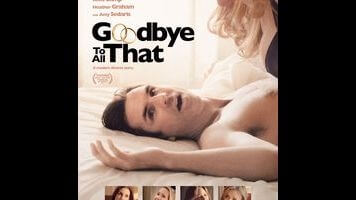Goodbye To All That is a poor showcase of Paul Schneider’s Southern charm

Paul Schneider, with his slightly nasal, airy voice and Southern politeness, has a specific energy as an actor that works wonders with certain writer-directors, like former classmate and collaborator David Gordon Green, or Cameron Crowe, who wrote him one of the best parts in the misbegotten Elizabethtown. Angus MacLachlan, making his directorial debut with Goodbye To All That, seems like a natural addition to that lineup. Junebug, which he wrote about a decade ago, nailed the familiar but sometimes uncomfortable feeling of returning home—of overhearing family members in the next room. It was even set in Schneider’s home state of North Carolina, as is the new film.
In its best moments, Goodbye To All That evokes similarly offhand familiarity, but it seems almost designed to let those moments slip away. Schneider plays Otto Wall, a husband and father who, the movie gradually reveals in its opening scenes, operates with a baseline of mild haplessness. Even his young daughter Edie (Audrey P. Scott) seems to notice, asking: “Why do these things always happen to Daddy?” She’s speaking about a fourwheeling accident where Otto busts his foot. Not long after, his wife Annie (Melanie Lynskey) announces that she wants a divorce. Or rather, her therapist does, during an ill-conceived scene made weirder by MacLachlan’s fussy overcutting, from the static master shots he favors elsewhere in the movie, over to one-shots, over to a slow pull-out, over to a different vantage point. Maybe it’s supposed to be disorienting, but a clunky scene where a wife has her therapist end her marriage has enough disorientation without wondering why the camera has suddenly and briefly moved 90 degrees.
In most of Otto’s interactions with Annie, he can only repeat her words back to her with muddled incredulousness, and the movie more or less echoes his inarticulate sentiments. It’s a shame to see the gifted Lynskey cast as a humorless and inscrutably dissatisfied insta-ex, especially when some scenes without her capture more genuine, unexpected slices of life, like Edie’s distress over a break-in at Otto’s new house, or Otto’s scattered re-connection with an old crush at a summer-camp reunion. There are also a lot of sex scenes; the movie is admirably frank about sex, but seems to view Internet dating as a never-ending source of gorgeous, blonde, sexually voracious women, available to throw themselves at even the most unassuming of fortysomething men. Even from these dramatically unpromising circumstances, the movie finds some room for characterization, as in a sweetly awkward scene where Otto attempts to talk dirty to a sex date (Ashley Hinshaw).
But MacLachlan overpowers his own ability to bring out the subtle nuances of this material when he introduces characters like Debbie Spangler (Anna Camp), who jumps back and forth between the aforementioned sexual voraciousness and hysterical repentance. She also has what MacLachlan obviously considers a funny name, because he has her emphatically repeat it several times. It’s not his only awkward name choice, assigning Otto the surname “Wall” in a movie that features a fair amount of Facebook-checking and a subplot about building a backyard garden wall. In between missteps, Goodbye To All That carves out some of its brief running time for the kind of quiet, low-key dramedy that complements the recessive charm of its leading man. But the movie itself turns so passive-aggressive—at once understanding and a little judgmental of most of its characters—that Schneider doesn’t have the space to settle into it.